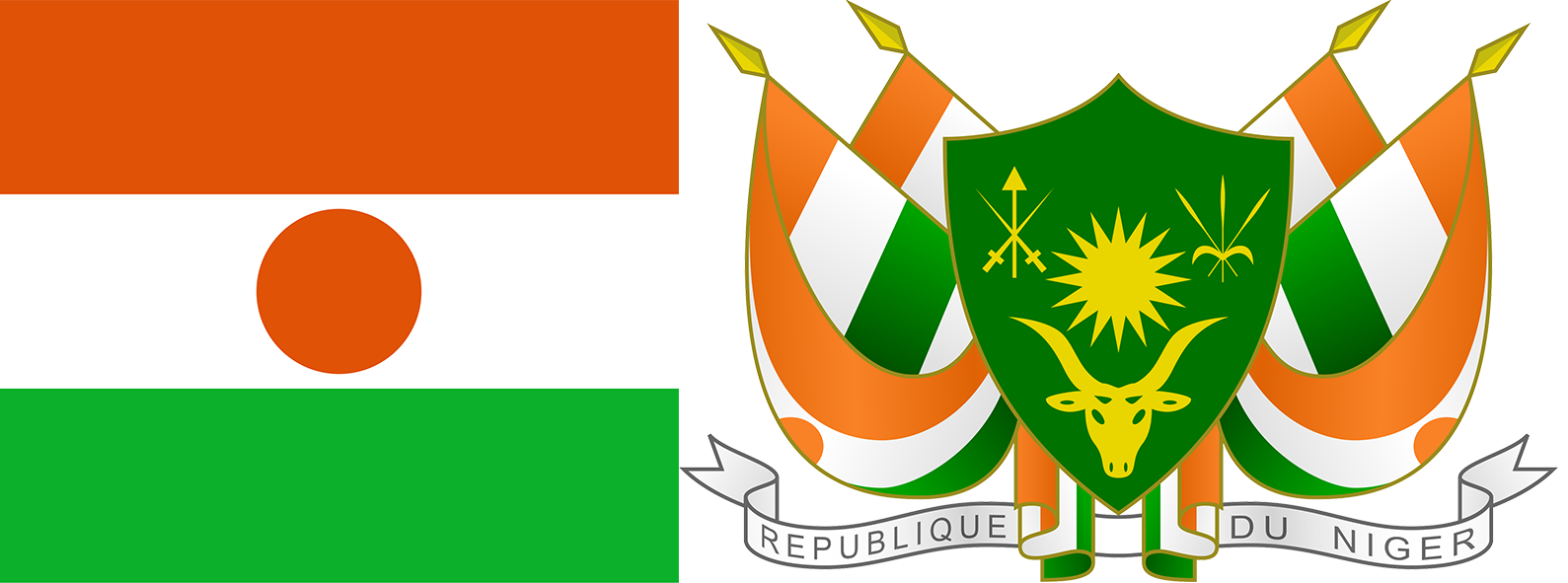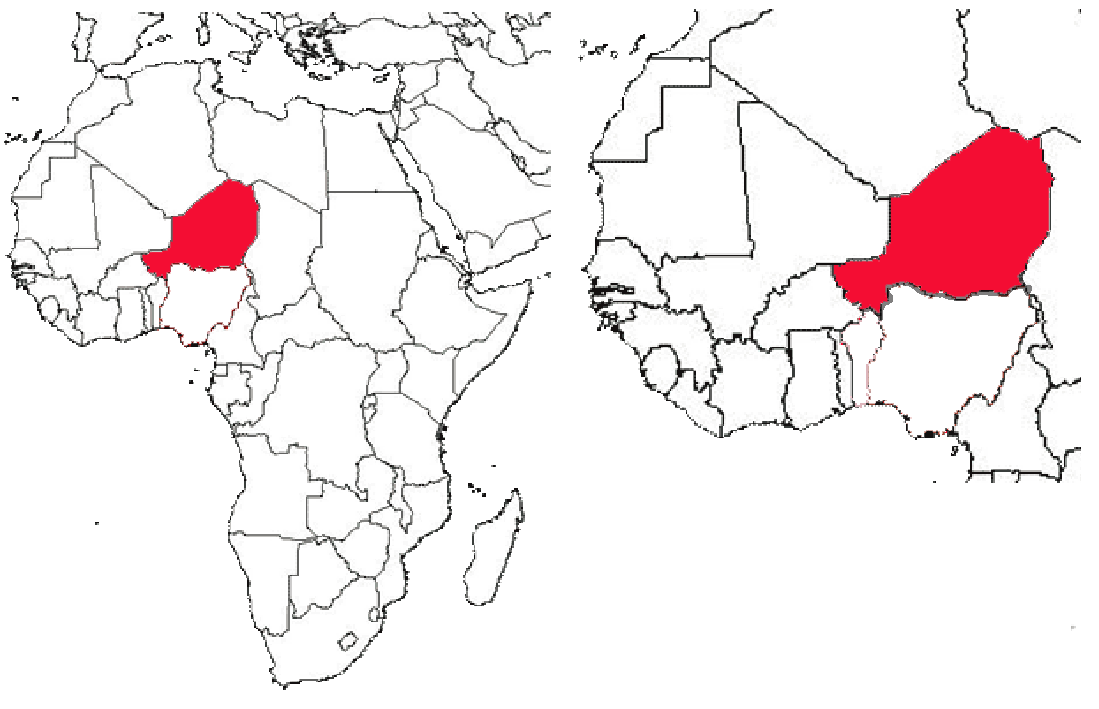FabulousFusionFood's Nigerien recipes Home Page
 The flag of Niger (left) and the Coat of Arms (right).
The flag of Niger (left) and the Coat of Arms (right).
Welcome to the summary page for FabulousFusionFood's Niger recipes, part of the African Continent. This page provides links to all the Nigerien recipes presented on this site, with 21 recipes in total.
Niger; officially: République du Niger; Republic of Niger is the third of the land-locked countries of West Africa (along with Burkina Faso and Mali). The capital city is Niamey and independence was gained from France on August 3rd, 1960. The largest ethnic groups in Niger are the Hausa, who also constitute the major ethnic group in northern Nigeria, the Djerma-Songhai, who also are found in parts of Mali, the Anasara from the north and the west, and the Chinois, from the far east. Both groups, along with the Gourmantche, are sedentary farmers who live in the arable, southern tier of the country. The remainder of Nigeriens are nomadic or semi-nomadic livestock-raising peoples—Fulani, Tuareg, Kanuri, Arabs, and Toubou. As with neighbouring countries the vast majority of Niger's populace are Muslim.
Most of Niger's population live in the south-west of the country near the Niger river basin. As such there is a preponderance of fish in the diet. Here traditional African cuisine is blended with influences from Europe; particularly Portugal and Britain. Spices like saffron, nutmeg, cinnamon, ginger and cloves were introduced by the Arabs and they are often part of the dishes served in modern Niger. The use of hot spices is also a feature of this country's cuisine. It should also be noted that Niger shares many recipes in common with neighbouring Nigeria.
Niger, officially the Republic of the Niger (République du Niger in French), is a landlocked country in West Africa. It is a unitary state bordered by Libya to the northeast, Chad to the east, Nigeria to the south, Benin and Burkina Faso to the southwest, Mali to the west, and Algeria to the northwest. It covers a land area of almost 1,270,000 km2, making it the largest landlocked country in West Africa and the second largest landlocked nation in Africa behind Chad. Over 80% of its land area lies in the Sahara. Its predominantly Muslim population of about 25 million lives mostly in clusters in the south and west of the country. The capital Niamey is located in Niger's southwest corner along the namesake Niger River.
 The image above shows Niger (red) in relation to Africa (left) and West Africa (right).Following the spread of Islam to the region, Niger was on the fringes of some states, including the Kanem–Bornu Empire and the Mali Empire before more significant parts of its territory became included in states such as the Sultanate of Agadez and the Songhai Empire. It was colonized by France during the Scramble for Africa as part of French West Africa, becoming a distinct colony in 1922. Since obtaining independence in 1960, Niger has experienced five coups d'état and four periods of military rule. Niger's seventh and most recent constitution was enacted in 2010, establishing a multiparty, unitary semi-presidential system. Following the most recent coup in 2023, the country is once again under a military junta.
The image above shows Niger (red) in relation to Africa (left) and West Africa (right).Following the spread of Islam to the region, Niger was on the fringes of some states, including the Kanem–Bornu Empire and the Mali Empire before more significant parts of its territory became included in states such as the Sultanate of Agadez and the Songhai Empire. It was colonized by France during the Scramble for Africa as part of French West Africa, becoming a distinct colony in 1922. Since obtaining independence in 1960, Niger has experienced five coups d'état and four periods of military rule. Niger's seventh and most recent constitution was enacted in 2010, establishing a multiparty, unitary semi-presidential system. Following the most recent coup in 2023, the country is once again under a military junta.
Niger's society reflects a diversity drawn from the independent histories of some ethnic groups and regions and their period living in a single state. The Hausa are the country's largest ethnic group, making up more than half the population. French is the country's official language, although it is spoken mainly as a second language and by a minority of the population; ten indigenous languages have the status of national language, of which Hausa is the most spoken one.
The name comes from the Niger River which flows through the west of the country. The origin of the river's name is uncertain. Alexandrian geographer Ptolemy wrote descriptions of the wadi Gir (in neighbouring modern Algeria) and the Ni-Gir 'Lower Gir' to the south, possibly referring to the Niger River. The modern spelling Niger was first recorded by Berber scholar Leo Africanus in 1550, possibly derived from the Tuareg phrase the (e)gărăw-n-gărăwăn meaning 'river of rivers'. There is broad consensus among linguists that it does not derive from the Latin niger 'black' as was first erroneously believed. The standard pronunciation in English is /niːˈʒɛər/, while in some Anglophone media /ˈnaɪdʒər/ is also used.
Typical Nigerien meals consist of a starch (rice being the most popular) paired with a sauce or stew. The starches eaten most often are millet and rice. Staple foods include millet, rice, cassava, sorghum, maize and beans. Couscous is saved for special occasions. Porridge, wheat dumplings, and beignets are some of Niger's popular snacks. One popular food is jollof rice.
Some spices were brought to Niger by Arabian travellers, and include ginger, nutmeg, cinnamon, saffron, and cloves.[1][7] Hot spices are also used in Nigerien cuisine. Sometimes spices are used to marinate meats to add flavour. Tea counts amongst one of the commonest beverages.
Niger; officially: République du Niger; Republic of Niger is the third of the land-locked countries of West Africa (along with Burkina Faso and Mali). The capital city is Niamey and independence was gained from France on August 3rd, 1960. The largest ethnic groups in Niger are the Hausa, who also constitute the major ethnic group in northern Nigeria, the Djerma-Songhai, who also are found in parts of Mali, the Anasara from the north and the west, and the Chinois, from the far east. Both groups, along with the Gourmantche, are sedentary farmers who live in the arable, southern tier of the country. The remainder of Nigeriens are nomadic or semi-nomadic livestock-raising peoples—Fulani, Tuareg, Kanuri, Arabs, and Toubou. As with neighbouring countries the vast majority of Niger's populace are Muslim.
Most of Niger's population live in the south-west of the country near the Niger river basin. As such there is a preponderance of fish in the diet. Here traditional African cuisine is blended with influences from Europe; particularly Portugal and Britain. Spices like saffron, nutmeg, cinnamon, ginger and cloves were introduced by the Arabs and they are often part of the dishes served in modern Niger. The use of hot spices is also a feature of this country's cuisine. It should also be noted that Niger shares many recipes in common with neighbouring Nigeria.
Niger, officially the Republic of the Niger (République du Niger in French), is a landlocked country in West Africa. It is a unitary state bordered by Libya to the northeast, Chad to the east, Nigeria to the south, Benin and Burkina Faso to the southwest, Mali to the west, and Algeria to the northwest. It covers a land area of almost 1,270,000 km2, making it the largest landlocked country in West Africa and the second largest landlocked nation in Africa behind Chad. Over 80% of its land area lies in the Sahara. Its predominantly Muslim population of about 25 million lives mostly in clusters in the south and west of the country. The capital Niamey is located in Niger's southwest corner along the namesake Niger River.
 The image above shows Niger (red) in relation to Africa (left) and West Africa (right).
The image above shows Niger (red) in relation to Africa (left) and West Africa (right).Niger's society reflects a diversity drawn from the independent histories of some ethnic groups and regions and their period living in a single state. The Hausa are the country's largest ethnic group, making up more than half the population. French is the country's official language, although it is spoken mainly as a second language and by a minority of the population; ten indigenous languages have the status of national language, of which Hausa is the most spoken one.
The name comes from the Niger River which flows through the west of the country. The origin of the river's name is uncertain. Alexandrian geographer Ptolemy wrote descriptions of the wadi Gir (in neighbouring modern Algeria) and the Ni-Gir 'Lower Gir' to the south, possibly referring to the Niger River. The modern spelling Niger was first recorded by Berber scholar Leo Africanus in 1550, possibly derived from the Tuareg phrase the (e)gărăw-n-gărăwăn meaning 'river of rivers'. There is broad consensus among linguists that it does not derive from the Latin niger 'black' as was first erroneously believed. The standard pronunciation in English is /niːˈʒɛər/, while in some Anglophone media /ˈnaɪdʒər/ is also used.
Niger Cuisine
The cuisine of Niger draws on traditional African cuisines. Various spices are used and meals include grilled meat, seasonal vegetables, salads, and various sauces. Meals in Niger usually start with colourful salads made from seasonal vegetables. Moringa leaves are a favourite for a salad.Typical Nigerien meals consist of a starch (rice being the most popular) paired with a sauce or stew. The starches eaten most often are millet and rice. Staple foods include millet, rice, cassava, sorghum, maize and beans. Couscous is saved for special occasions. Porridge, wheat dumplings, and beignets are some of Niger's popular snacks. One popular food is jollof rice.
Some spices were brought to Niger by Arabian travellers, and include ginger, nutmeg, cinnamon, saffron, and cloves.[1][7] Hot spices are also used in Nigerien cuisine. Sometimes spices are used to marinate meats to add flavour. Tea counts amongst one of the commonest beverages.
The alphabetical list of all Nigerien recipes on this site follows, (limited to 100 recipes per page). There are 21 recipes in total:
Page 1 of 1
| Attiéké et Aloko Poisson (Attieke and Fish Aloko) Origin: Niger | Dan Waké Origin: Niger | Maïs Grillé (Barbecued Corn Cobs) Origin: Niger |
| Boulettes à l'igname Nigerienne (Yam Dumplings from Niger) Origin: Niger | Date Sauce Origin: Niger | Moloukhia (Jute Leaf Stew) Origin: Niger |
| Brabusko Origin: Niger | Dounguouri Soko (Meat Stew with White Beans) Origin: Niger | Poulet aux Arachides de Niger (Chicken with Peanuts, Niger Style) Origin: Niger |
| Cecena Origin: Niger | Dunguri nda Mo (Rice and Black-eyed Peas) Origin: Niger | Sauce Gombo Origin: Niger |
| Cocktail Mangue Orange (Mango and Orange Cocktail) Origin: Niger | Ewa Dodo (Black-eyed peas with Plantains) Origin: Niger | Souko Dounguouri (Meat Stew with White Beans) Origin: Niger |
| Couscous à la Nigérienne (Niger-style Couscous) Origin: Niger | Fari Masa Origin: Niger | Tamina (Semolina Dessert) Origin: Niger |
| Dambou (Rice Couscous with Moringa) Origin: Niger | Lémou Hari (Lemon Juice with Ginger) Origin: Niger | Touo du Niger (Nigerienne Touo) Origin: Niger |
Page 1 of 1